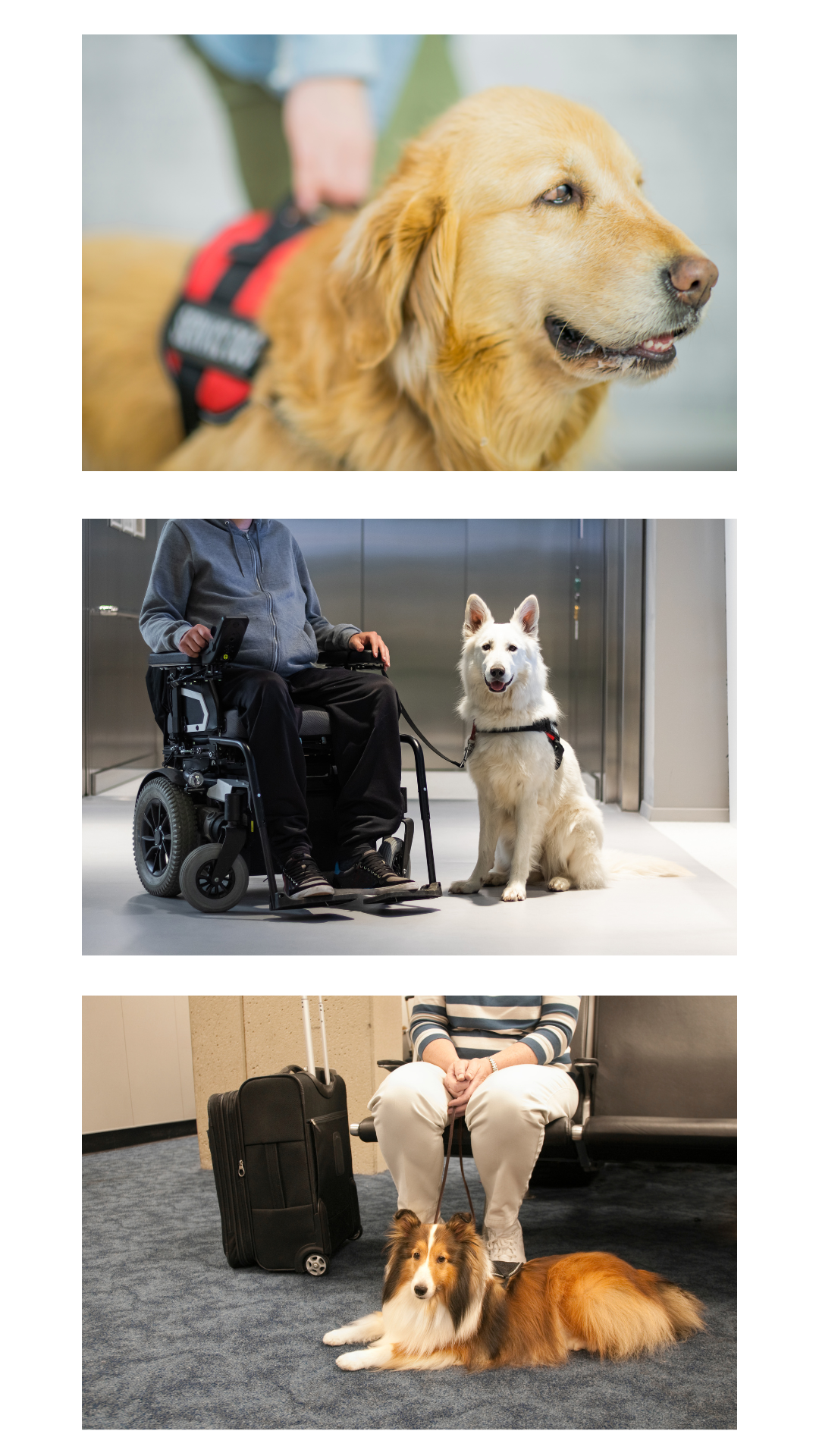Training Programs
At Lean On Me Canine Assistance, we believe everyone deserves the companionship and support of a service dog, no matter their accreditation status. We set high standards to ensure our dogs and their handlers receive top-notch training. Since people rely on their service dogs for safety and companionship, we make sure everything we do meets the highest quality standards.
Step 1: Selection and Evaluation
Before training begins, we carefully select dogs based on temperament, intelligence, and health. These qualities are crucial for a successful service dog. Our evaluation includes:
Temperament Testing: Ensuring the dog is calm, friendly, and adaptable.
Health Screening: Comprehensive veterinary checks to confirm the dog is in optimal health.
Behavioral Assessment: Observing the dog's natural behaviors and tendencies to ensure they align with the demands of service work.

Step 2: Basic Obedience Training
The foundation of any service dog’s training is solid obedience. This phase covers:
Basic Commands: Teaching commands such as sit, stay, come, heel, and down.
Socialization: Exposing dogs to various environments, people, and other animals to build confidence and adaptability.
House Manners: Training dogs to behave appropriately indoors, including not jumping on furniture or people.
Step 3: Advanced Training
Once basic obedience is mastered, dogs move on to advanced training tailored to their future roles.
This includes:
Task-Specific Training: Teaching dogs the specific tasks they will need to perform for their handler, such as:
- Mobility Assistance: Retrieving dropped items, opening doors, providing stability.
- Medical Alert: Detecting and responding to medical conditions, such as alerting to seizures or low blood sugar.
- Psychiatric Support: Recognizing and responding to signs of anxiety or PTSD, providing comfort during distressing episodes.
Public Access Training: Ensuring dogs are well-behaved and focused in public settings, such as stores, restaurants, and public transportation.

Step 4: Customization for Individual Needs
Each user’s needs are unique, so we further tailor the dog’s training to match these specific requirements:
Personalized Task Training: Refining tasks to cater to the user’s particular lifestyle and routines.
Handler Training: Involving the future handler in the training process to establish a strong bond and ensure they can effectively manage their service dog.
Home Visits: Conducting sessions in the user’s home environment to ensure the dog is well-adapted and fully functional in their everyday surroundings.
Step 5: Ongoing Support and Follow-Up
Our commitment to service dog teams doesn’t end once training is complete:
Follow-Up Visits: Regular check-ins to ensure the service dog continues to perform well and address any emerging issues.
Continued Education: Providing additional training sessions as needed to adapt to changing needs or new tasks.
Support Network: Offering resources and support for the handler to ensure both their and the dog’s well-being.
Types of Service Dogs
-
Guide Dogs:
Guide dogs assist individuals who are blind or visually impaired by navigating obstacles and helping them safely travel from one location to another.
-
Hearing Dogs:
These dogs are trained to assist individuals who are deaf or hard of hearing by alerting them to important sounds such as doorbells, alarms, or someone calling their name.
-
Mobility Assistance Dogs:
These dogs aid individuals with mobility impairments by helping them with tasks such as opening doors, retrieving items, or providing stability and balance support.
-
Medical Alert Dogs:
These dogs are trained to detect changes in a person's body odor or behavior associated with certain medical conditions, such as seizures, diabetes, or allergies. They can then alert their handlers or others to take appropriate action.
-
Psychiatric Service Dogs:
Trained to assist individuals with mental health conditions, psychiatric service dogs can provide support by interrupting destructive behaviors, providing comfort during anxiety or panic attacks, and creating personal space in crowded environments.
-
Autism Assistance Dogs:
Specifically trained to assist individuals with autism spectrum disorders, these dogs can provide calming effects, reduce stress, and offer companionship to help with social interactions.
-
Seizure Response Dogs:
These dogs are trained to respond during or after a seizure. They may provide physical support, retrieve medications, or seek help from others.
-
Allergy Detection Dogs:
Trained to detect specific allergens, these dogs can help individuals with severe allergies by alerting them to potential dangers or even retrieving medication.
-
Diabetic Alert Dogs:
These dogs are trained to detect changes in blood sugar levels and alert individuals with diabetes, allowing them to take necessary actions to manage their condition.
-
PTSD (Post-Traumatic Stress Disorder) Dogs:
Trained to assist individuals with PTSD, these dogs can provide emotional support, interrupt anxiety-inducing behaviors, and create a sense of security.

These are only some of the disabilities which service dogs serve to, but there are more disabilities which might be more specific for each user.
It's important to note that service dogs are protected by laws in many countries, allowing them to accompany their handlers in public places and ensuring equal access. Each service dog is trained based on the specific needs of its handler, and the tasks they perform contribute to enhancing the individual's independence and quality of life.
How does Lean on me Canine Assistance work?
Each user has a different condition and has different needs, remember that finding the right service dog trainer may take time and research, but investing in proper training will lay the foundation for a successful and fulfilling partnership with your service dog.
At Lean on me Canine Assistance we provide you with the information to start the necessary process and complete the necessary training for your requirements.
Contact us:
asistenciacaninalmca@gmail.com
